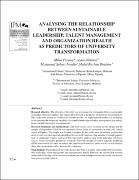| dc.contributor.author | Miiro, Farooq | |
| dc.contributor.author | Othman, A | |
| dc.contributor.author | Nordinc | |
| dc.contributor.author | Ibrahim, Mohd B | |
| dc.date.accessioned | 2018-04-24T14:55:19Z | |
| dc.date.available | 2018-04-24T14:55:19Z | |
| dc.date.issued | 2017 | |
| dc.identifier.citation | Farooq, M., Othman, A., Nordin, M. S., & Ibrahim, M. B. (2017). Analysing the Relationship between Sustainable Leadership, Talent Management and Organization Health as Predictors of University Transformation. Journal of Positive Management, 8(1), 32. | en_US |
| dc.identifier.issn | 2083-103X | |
| dc.identifier.issn | 2392-1412 | |
| dc.identifier.uri | http://hdl.handle.net/20.500.12309/521 | |
| dc.description.abstract | Research objective: The objective of the study was to examine the relationship between sustainable
leadership, talent management and organizational health as predictors of university transformation.
This study went further to establish the mediation effect of organizational health as a mediating
factor between the exogenous variables (sustainable leadership and talent management) and endogenous
variable (university transformation).
Research technique and methodology: The study used a cross sectional survey design and the
sample of respondents (N=820) was randomly chosen from six universities in which the central
region of Uganda. The sample was deemed convenient for this study since the method used for data
analysis was structural equation modelling that normally requires a big number of sample population.
A confirmatory factor analysis (CFA) was used to analyze each of the individual constructs
used to attain reasonable parameters estimates. The fully fledged structural equation modelling
(SEM) was used in the study to analyze the hypothesized structural model and its casual relationships
plus the mediation effect between the constructs.
Main findings: The findings of the study showed that there is positive relationship between sustainable
leadership, talent management and organizational health. However, the relationship between
sustainable leadership and university transformation, talent management and university transformation
were negatively related.
33
Practical implications: It was recommended to educational practitioners, lecturers and policy makers
to use this model to harness university transformation. For researchers, it could be used to do further
examination of university transformation on other universities both locally and internationally. | en_US |
| dc.language.iso | en | en_US |
| dc.publisher | Journal of Positive Management | en_US |
| dc.subject | leadership | en_US |
| dc.subject | Talent management | en_US |
| dc.subject | Organizational health | en_US |
| dc.subject | University transformation | en_US |
| dc.title | Analysing the relationship between sustainable leadership, talent management and organization health as predictors of university transformation | en_US |
| dc.type | Article | en_US |

